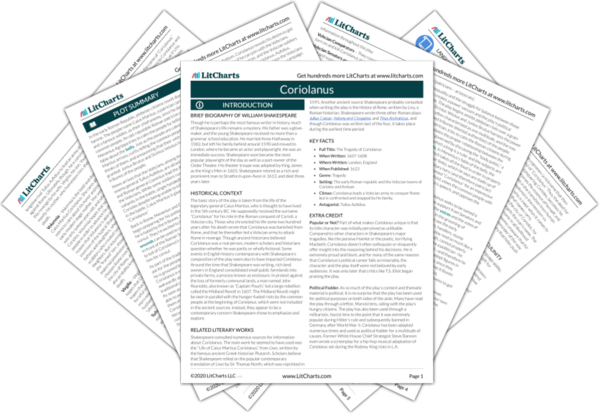Welcome to the LitCharts study guide on William Shakespeare's Coriolanus. Created by the original team behind SparkNotes, LitCharts are the world's best literature guides.
Coriolanus: Introduction
Coriolanus: Plot Summary
Coriolanus: Detailed Summary & Analysis
Coriolanus: Themes
Coriolanus: Quotes
Coriolanus: Characters
Coriolanus: Symbols
Coriolanus: Literary Devices
Coriolanus: Theme Wheel
Brief Biography of William Shakespeare

Historical Context of Coriolanus
Other Books Related to Coriolanus
- Full Title: The Tragedy of Coriolanus
- When Written: 1607-1608
- Where Written: London, England
- When Published: 1623
- Genre: Tragedy
- Setting: The early Roman republic and the Volscian towns of Corioles and Antium
- Climax: Coriolanus leads a Volscian army to conquer Rome but is confronted and stopped by his family.
- Antagonist: Tullus Aufidius
Extra Credit for Coriolanus
Popular or Not? Part of what makes Coriolanus unique is that its title character was initially perceived as unlikable. Compared to other characters in Shakespeare’s major tragedies, like the pensive Hamlet or the poetic, terrifying Macbeth, Coriolanus doesn’t often soliloquize or eloquently offer insight into the reasoning behind his decisions. He is extremely proud and blunt, and for many of the same reasons that Coriolanus’s political career fails so miserably, the character and the play itself were not beloved by early audiences. It was only later that critics like T.S. Eliot began praising the play.
Political Fodder. As so much of the play’s content and thematic material is political, it is no surprise that the play has been used for political purposes on both sides of the aisle. Many have read the play through a leftist, Marxist lens, siding with the play’s hungry citizens. The play has also been used through a militaristic, fascist lens to the point that it was extremely popular during Hitler’s rule and subsequently banned in Germany after World War II. Coriolanus has been adapted numerous times and used as political fodder for a multitude of causes. Former White House Chief Strategist Steve Bannon even wrote a screenplay for a hip-hop musical adaptation of Coriolanus set during the Rodney King riots in L.A.












